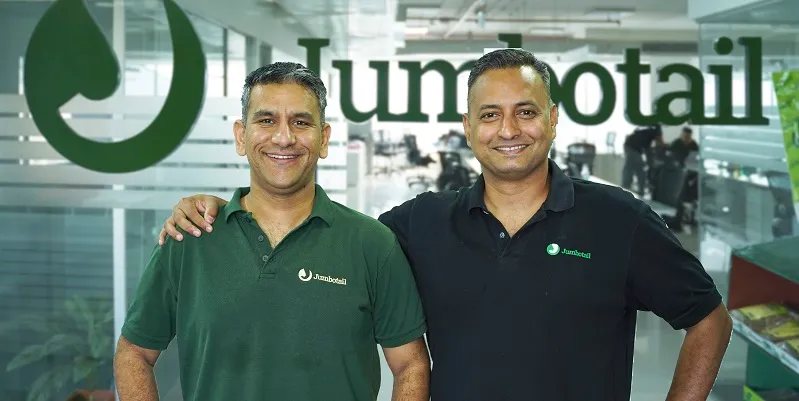Bengaluru startup Jumbotail is digitising the kirana store with its wholesale online marketplace
Jumbotail is a wholesale online marketplace for local kirana stores with a full-stack model, including storefront delivery and payments collection for sellers. The startup states it brings in a sense of transparency in the market, especially with prices displayed for store owners to see.
With several online grocery platforms dotting the startup ecosystem, it is easy to believe that most Indians now rely on the likes of BigBasket, Grofers, Amazon Prime, and Milkbasket for their pantry staples.
But reality paints a different picture.
As much as 90 percent of India's $700 billion retail market is unorganised, mostly made up of neighbourhood kirana stores. While they may not have the glamour of large stores or online players, they offer unmatched consistency and efficiency.
Yet, one of the biggest challenges for local kirana is getting its inventory right, as many of the store owners have to travel several kilometres to stock up. Seeing an opportunity, Ashish Jhina and S Karthik Venkateswaran founded Jumbotail in 2015 - a wholesale online marketplace for kirana stores.

Founders Ashish Jhina and S Karthik Venkateswaran started Jumbotail in 2015, which has tied up with over 20,000 kirana stores in Bengaluru since.
In the last four years, Jumbotail has tied up with over 20,000 kirana stores in Bengaluru, and has raised $23.2 million in funding.
The Bengaluru-based startup provides full-stack services for kirana stores, including storefront delivery and payments collection for its sellers. It also has a fintech platform that provides payment solutions and access to working capital credit from its lending partners to its customers.
Additionally, it helps mom-and-pop entrepreneurs run their convenience retail stores as a retail-as-a-service with PoS fully integrated with its supply chain and fintech platform.
Why work on the demand side
The idea of wanting to work in online retail and kirana space was strong in Karthik’s mind since 2008. Hailing from Madurai and having served in the Indian Army for 10 years, he believes that if there is something to be done for the country, it should be done pronto.
“I kept thinking how to bring an impact on the country using economic empowerment. My initial thought around the food and agriculture sector was supply chain aggregation. I was trying to do something by aggregating coconut farmers near my hometown,” says Karthik.
That led to the birth of kisan.co, which didn’t take off.
Eventually, the entrepreneur realised that the work needs to start from demand aggregation and not supply aggregation because there is a lack of visibility when it comes to demand flow across millions of kirana stores. After all, supply cannot be fixed without fixing demand. This way, farmers will also grow when demand is better streamlined.
Karthik explains, “If I go to Madurai and aggregate all coconut farmers there, I still have to go to the nearest mandi and sell. The agent you are trying to circumvent will be the same person who is going to buy from you.”
On the other hand, on the demand side, an efficient infrastructure is important. While this idea was running through his head, Karthik was pursuing an MBA at Stanford, where he met Ashish in 2009.
The full-stack model
Ashish is a professional farmer, having worked on his own farmland for a year before co-founding Jumbotail. An IIT Delhi alumnus, he worked for BCG after completing his MBA from Stanford. Like Karthik, Ashish also realised the gaps in the supply chain and had come to the same conclusion.
Karthik worked at eBay after graduating from Stanford and then joined Flipkart, where he understood that it is important to control the full stack.
Finally, in 2014, the two started working on their idea and founded Jumbotail. The platform focusses on staples (rice, edible oil, sugar, atta, pulses, dry fruits, etc), packaged foods, other FMCG products, personal care items, and home care products.

The Jumbotail warehouse.
“All the things you see in a neighbourhood kirana store are available on our platform,” says Karthik. Jumbotail follows three models - store inventory, seller store inventory, and pickup service for orders placed.
While it wasn’t difficult getting suppliers online, the problem was convincing store owners to use the app.
“But we made a simple product suited for 2G/3G network and, soon, they adopted it. We don’t have any sales force to date, and have eliminated the sales cost from the process. Also, we invested in design instead to build a basic and simple product,” says Karthik.
He adds that Jumbotail brings in a sense of transparency in the market, especially with prices displayed for store owners to see.
“Even if the price differs on the delivery day, Jumbotail will proceed with the price of the order day. Given that we have the inventory, there is no cash burn when market price changes,” says Karthik.
Managing the stack
At present, Jumbotail has two fulfilment centres outside Bengaluru in Tumkuru, and eight distribution centres. For logistics, it ties up with vehicles on a monthly lease and has 110 vehicles now. While 95 percent of its customers are kirana stores, the rest comprise hotels that want to take advantage of the ease Jumbotail platform offers.
“The breadth of things Jumbotail deals with include a 2.2 g sachet of coffee to a 50 kg bag of sugar. Thus, packaging works differently and it is best that we handle the whole chain,” says Karthik.
According to ANAROCK Retail consultancy, India’s offline retail market will be worth $1.3 trillion by 2020. The country is the world’s sixth largest grocery market, with only five to eight percent of grocery stores organised. Reports suggest that Reliance is set to digitise five million kirana stores by 2023.
Speaking of their investment in Jumbotail, Sameer Brij Verma, Managing Director of Nexus Venture Partners, says, "Jumbotail's full-stack approach to modernise general trade via cutting-edge, tech-driven supply chain, data-driven merchandising, and credit is the most scalable way to revolutionise India's grocery retail. The company is well positioned to power the online-to-offline new retail rollouts in the country in the coming years.”
At present, the platform’s average basket size is Rs 5,000. Karthik claims that 80 percent of its GMV comes from customers who buy a minimum of 10 days a month.
“We are currently perfecting this model in Bengaluru. By the end of this year, we will be close to operational profitability. In the next three to five years, we plan to expand to top eight to 10 cities in the country,” says Karthik.
(Edited by Saheli Sen Gupta)



![[Startup Bharat] Here's how this Indore-based B2B ecommerce startup made Rs 1 Cr in a day from ...](https://images.yourstory.com/cs/2/a9efa9c0-2dd9-11e9-adc5-2d913c55075e/shopkirana1562232197204.png?fm=png&auto=format&h=100&w=100&crop=entropy&fit=crop)






